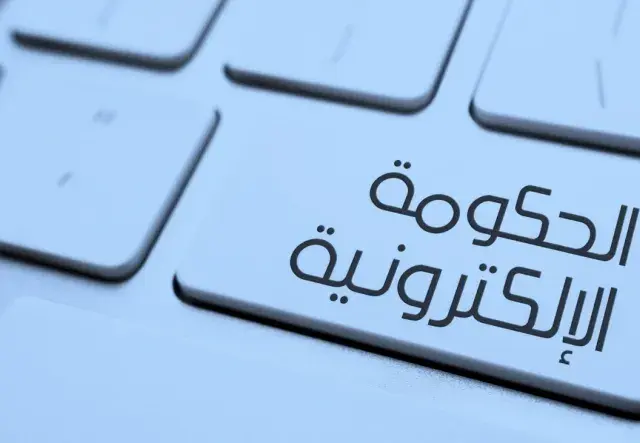Policy Brief: Advancing E-Governance and Digital Transformation in Iraq

Iraq’s current digital landscape is nascent, and the government is still heavily reliant on paper-based processes. Indeed, in 2024 Iraq ranked 145th out of a total of 193 countries worldwide in the UN’s e-government development index. The lack of e-governance infrastructure is an obstacle to transparency, enables corruption, and decreases access to government services, particularly for people with mobility issues and some women who are unable to travel alone for social or religious reasons. The continued weakness of e-governance in Iraq is due to a series of interrelated challenges, including limited political will, lack of an adequate legal framework, fragmentation of Iraq’s digital landscape, poor cybersecurity measures, and the lack of the necessary infrastructure and digital skills among both public servants and the broader population.
Despite this, Iraq’s relative economic and political, along with some successful examples of e-governance projects within the public sector, suggest that this is an opportune moment for the adoption of long-term e-governance projects. Such initiatives have the potential to enhance service delivery, boost investments, and notably improve the quality of life for Iraqi citizens if certain other factors are also met.
In light of the above, it is recommended:
For the Iraqi Government:
1. Develop a Long-term Digital Strategy: Create and implement a comprehensive digital government strategy that outlines clear objectives, timelines, and responsibilities. This strategy should include a robust legal framework, secure funding mechanisms, and strategic communication plans. The goal of this strategy should be to increase access to government services and participation in decision-making and support transparency, fairness, and accountability of government while respecting human rights.
2. Enhance Coordination: Establish a centralized e-governance coordination body to streamline efforts across ministries and departments. This body should facilitate collaboration, ensure alignment of digital initiatives, and manage the implementation of digital projects.
3. Strengthen Cybersecurity: Develop and enforce a comprehensive cybersecurity strategy. This should include strict security protocols, a dedicated and non-political authority for cybersecurity oversight, and regular security audits to protect sensitive information and build public trust.
4. Invest in Digital Skills and Infrastructure: Launch nationwide digital literacy programs and provide targeted training for government officials. Upgrade technological infrastructure to ensure reliable internet access and modernize public sector IT systems.
For Civil Society:
1. Raise Awareness: Conduct awareness campaigns to educate the public about the benefits of e-governance and digital services. Highlight the importance of digital literacy and cybersecurity to ensure informed and secure use of digital tools.
2. Advocate for Legal Reforms: Engage in advocacy efforts to push for the enactment of essential e-governance laws, such as data protection and cybersecurity legislation. Collaborate with government bodies to ensure these laws are comprehensive and effectively implemented. Civil society should also be aware of possible restrictions of digital civic space and ensure that legal frameworks protects digital rights.
3. Promote Citizen Engagement: Encourage citizen participation in digital governance initiatives. Provide platforms for feedback and collaboration between the public and government to enhance transparency and accountability.
For the International Community:
1. Provide Technical Assistance: Offer technical support and expertise to help Iraq develop and implement its digital transformation strategy. This can include sharing best practices, providing training, and assisting in the development of legal frameworks.
2. Support Capacity Building: Fund and facilitate capacity-building programs focused on enhancing digital skills within the Iraqi public sector. Support initiatives aimed at improving digital literacy among the general population.
3. Foster International Collaboration: Encourage collaboration between Iraq and other countries with advanced e-governance systems. Facilitate knowledge exchange and partnerships to help Iraq adopt successful digital governance models.
4. Invest in Infrastructure Projects: Provide financial and technical support for infrastructure projects that improve internet access and technological capabilities in Iraq. This will help bridge the digital divide and ensure that all citizens can benefit from digital services. Investment projects should be transparent and require participatory processes.
Introduction
This policy brief examines Iraq's digital landscape and the significant challenges in developing its e-governance infrastructure while offering strategic recommendations for key stakeholders. Iraq's bureaucratic infrastructure remains primarily paper-based, ranking 145th among 193 countries in the UN's e-government development index as of 2024. The absence of robust e-governance systems contributes to challenges such as rampant corruption and limited access to public services for those with mobility restrictions or societal constraints, like some women. These issues stem from limited political will, inadequate legal frameworks, a fragmented digital landscape, insufficient cybersecurity measures, and a general lack of necessary infrastructure and digital skills among public officials and citizens.
Despite these challenges, the current relative stability in Iraq's economy, politics, and security presents an ideal opportunity to implement substantial projects to enhance the country's e-governance. Successful initiatives already in place within the public sector indicate potential for improvement. Advancing e-governance could improve public service delivery, stimulate investment, and notably enhance Iraqi citizens' overall quality of life, marking steps toward sustainable development and governance.
However, challenges remain, especially if e-governance initiatives are used to limit digital civic spaces further. Hence, it is important to adopt a holistic approach where digital transformation initiatives consider digital rights.
E-governance has the potential to advance progress across all 17 United Nations Sustainable Development Goals (SDGs), particularly SDG 16, which focuses on peace, justice, and strong institutions. By enhancing the relationship between citizens and the state and improving the efficiency of government service delivery, e-governance can foster a more accountable and transparent governance framework.
The findings of this policy brief are based on an extensive review of existing literature on e-governance in Iraq, as well as insights from a workshop organised by Tech4Peace. The workshop brought together experts and practitioners in the fields of internet governance and e-governance from the government, private sector, and civil society in Iraq. It aimed to garner their views on the opportunities and challenges to digital transformation in the country.
Iraq’s Digital Landscape
Iraq’s public administration relies heavily on paper-based processes, a method that underscores the outdated organisation of ministries. In practice, this means that communications between and within ministries are printed out, with the relevant authority either responding through a hand-written note or signing or stamping the document, before it is hand delivered or scanned and sent back to the sender via email or through platforms such as WhatsApp. The paper-based system employed by public administrators also means that, for the most part, citizens requiring government services have to be physically present at public offices, with printed versions of forms and other documents. At the government offices themselves, citizens must move around between different officials to get the necessary paperwork completed, a frustrating task that can sometimes take months to complete.
The reliance on paper-based systems in Iraq’s public administration raises a set of interrelated issues, including 1) the continued printing out of every single government document is not only costly but also harms the environment; 2) leaks of sensitive data and/or personal information due to the lack of digital storage and cybersecurity measures; 3) the need for citizens to be physically present at government offices limits access to those who are unable to travel to the office location; 4) the lack of streamlined and clear public administration processes allows corruption and bribery to thrive and decreases public trust in government.
Despite the widespread use of paper-based systems in Iraq’s public administration, there have been some successful attempts at digitalisation. For example, recently, the governor of Iraq’s Central Bank announced the “electronic collection digital project”, which will allow financial transactions across government institutions to take place online starting in 2024. The adoption of this project suggests that there is the interest and opportunity to develop Iraq’s e-governance structures further. Given that Iraq is experiencing a period of relative stability, there is a timely window for long-term planning, as opposed to the adoption of policies aimed at tackling short-term crises.
In the remainder of this policy brief, it is argued that to establish an effective e-governance system, Iraq requires political will and support, proper coordination, a robust legal framework, strong cybersecurity measures, and digital skills and infrastructure. These elements are crucial to ensuring the success of e-governance initiatives and the broader digital transformation in the country.
Political will
Political will and support are foundational to successful digital transformation. Despite recognising the importance of digital governance in Iraq, consistent and robust political commitment is often lacking. High-level advocacy from political leaders is essential to driving policy direction, allocating resources, and sustaining momentum for digital initiatives. Strong political backing can also help overcome resistance within the bureaucracy and foster a culture that embraces digital change.
Recently, the government of Mohammed Shiaa Al-Sudani has been actively promoting strategies to streamline e-governance. However, these efforts have occasionally encountered setbacks when not implemented carefully. For instance, the rapid introduction of new systems at Iraq's border crossings and insufficient staff training resulted in operational disruptions. These included the closure of offices and significant delays, highlighting the importance of thorough planning and adequate training to deploy e-governance initiatives successfully.
Legal Framework
A comprehensive legal framework is necessary to underpin digital transformation. Iraq's existing legal infrastructure is inadequate to support widespread e-governance. Key areas such as data protection and cybersecurity lack sufficient legal backing as no current legislation exists for them. Therefore, the vulnerability of much of Iraq’s online data can compromise the integrity of e-governance projects, potentially jeopardizing their success and effectiveness. Addressing these gaps through new legislation and amendments to existing laws is critical. A strong legal foundation will provide clarity and security for the bureaucracy and citizens, fostering an environment where digital initiatives can thrive, and public trust can be established.
Iraq faces a significant legal framework gap concerning internet governance, electronic governance, and cybersecurity. Although some legislative efforts are underway to address these issues, there are growing concerns about how these proposed laws might impact civil liberties. For example, the Iraqi parliament has read drafts of the cybercrime law, and there are discussions regarding the legislation of the Right to Access Information law.
However, there is apprehension that these laws could restrict civil spaces and limit freedom of expression, potentially hindering the ability of civil society and other stakeholders to engage effectively in these areas. For example, the proposed law on cybercrimes is vaguely worded and allows the government to sentence to life imprisonment or a fine of 50 million Iraqi dinars to anyone who is deemed to undermine Iraq’s “economic, political, military or security interests”. It is important to find a balance in law-making to ensure that while enhancing security and governance, the laws do not unintentionally decrease civic engagement or limit fundamental freedoms. This could deter citizens from fully cooperating with e-governance initiatives and affect their effectiveness.
Coordination
While there is a division within the Council of Ministers Secretariat (CoMSec) tasked with overseeing e-governance, Iraq’s digital landscape remains fragmented. Various government entities operate their own information technology (IT) directorates, each with differing capabilities, including in relation to data sharing, and not all of these directorates coordinate effectively with CoMSec. This lack of uniformity leads to scattered efforts where each entity acts independently, resulting in weak centralisation and coordination.
At the same time, robust data protection policies and practices are crucial. It's essential to ensure that data is not completely un-siloed; for instance, law enforcement should not have access to personal data, particularly digital ID databases that include biometric data, without a warrant from an independent judicial authority. Implementing such measures will help prevent the abuse of power by authorities, especially in situations where there is restricted freedom of expression and limited space for civil society mobilization.
Therefore, coordination among government agencies is important for the seamless implementation of digital initiatives and data sharing. Effective e-governance requires a centralized body to streamline efforts, avoid duplication, and ensure all ministries and departments work towards common goals. This body would also facilitate communication and collaboration, helping to integrate digital services across various sectors and enhancing overall efficiency. In addition, establishing standardised data management practices and ensuring secure data exchange between institutions will enhance interoperability. This, if combined with other factors, will lead to better coordination, improved public services, and a more transparent government.
Cybersecurity
Iraq has faced significant cybersecurity challenges, including frequent hacking incidents targeting government websites and the leakage of personal information. Compromised data is not only shared on social media platforms but also sold on the dark web. For example, 30 government websites were hacked in 2019, including that of the ministries of interior, defence, foreign affairs and health. More recently, in 2023, the government partly shut down Telegram, citing national security purposes, after the personal information of Iraqi citizens from confidential government databases was leaked in one Telegram group. The political landscape, characterised by rivalries and politically sanctioned corruption, exacerbates these issues. Individuals appointed to sensitive positions within the civil service often have strong political affiliations and may exploit access to data for personal or partisan advantage.
Cybersecurity is a critical component of digital maturity. There are significant vulnerabilities in Iraq's current cybersecurity measures. Without a coherent policy and robust security protocols, government systems are at risk of cyber threats. Developing a comprehensive cybersecurity strategy, coupled with strict implementation of security measures, is essential. Protecting sensitive data and ensuring the integrity of digital services will build public confidence and safeguard the digital infrastructure.
Digital Skills and Infrastructure
Building digital skills and infrastructure are vital for the adoption and success of e-governance. There is currently a considerable skills gap among public sector employees and the general population. This gap hinders the effective use of digital tools and services. A report by UNICEF from 2022 found that 60% of youth lacked the digital skills necessary for employment and social inclusion. In addition, there is a lack of basic infrastructure in many government institutions, such as hardware and software. Where basic infrastructure has been provided, it is usually outdated or, due to lack of maintenance, is broken beyond repair. In addition, given that as of 2023, 25% of Iraq’s population lives under the poverty line, many citizens may not be able to afford the equipment necessary for them to participate in e-governance processes or have access to a secure and stable internet connection.
Therefore, it is crucial to invest in digital literacy programs, especially for young people who are either already in public employment or likely to enter the job market in coming years, as well as to provide targeted training for government officials and upgrade technological infrastructure. Such initiative must include an assessment of the hardware and software needs of different public institutions and budget for the cost of maintaining such equipment. In addition, in order to ensure that all citizens have access to electronic government services, it is also vital to invest in improving internet access and public services, such as libraries, where citizens may be able to access IT facilities free of charge. Enhancing digital skills and IT infrastructure will ensure that both public servants and citizens can effectively utilize and benefit from e-governance initiatives, driving overall digital transformation.
Conclusion
This policy brief has mapped a series of challenges faced by the government of Iraq in developing its e-governance structures. It has also provided a series of recommendations that the government of Iraq, civil society and the international community can utilise in their work on the digital transformation, including in the areas of cybersecurity, digital skills and infrastructure, political will, coordination and the legal framework.
E-governance alone will not solve the widespread corruption issues that Iraq is facing, nor will it provide complete transparency to government activities and the ruling elite. However, research has shown that it is a step in the right direction and, if complemented by other factors such as political will and proper legal frameworks, it can be more effective.
The development of e-governance structures in Iraq is crucial to increasing transparency, boosting government trust and the creation of an inclusive democracy. Despite the multiple and interrelated challenges that Iraq faces in this regard, the relative stability that the country is currently experiencing make it an opportune moment to push for such a project. Ultimately, improved e-governance will work to enhance government services and provide a better quality of life to all Iraqis.
Link to the original article :https://t4p.co/blog/2024-06-26-digital-transformation-in-iraq
This article was written by Tech4Peace Organisation and is licensed under CC BY-NC 4.0.






